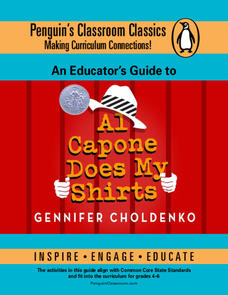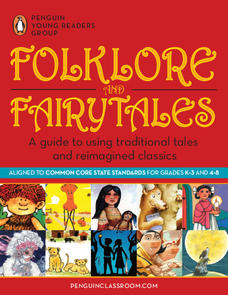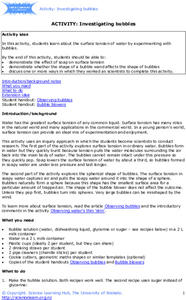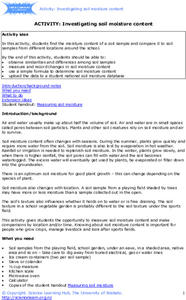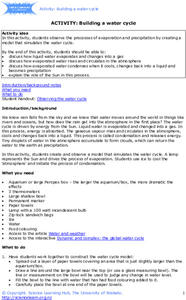Penguin Books
An Educator's Guide to The Green Glass Sea by Ellen Klages
A lot of secrecy shrouded the creation of the atomic bomb. Readers uncover some of that secrecy using an educator's guide for the novel The Green Glass Sea. Three weeks of lesson plans feature discussion questions and reading...
Penguin Books
An Educator's Guide to Al Capone Does My Shirts
It's hard to imagine that life on Alcatraz could be dull. A series of intriguing lessons take readers through the novel Al Capone Does my Shirts. Pre-reading questions introduce the text and a range of suggestions, from comic strips to...
Penguin Books
An Educator’s Guide to Savvy by Ingrid Law
Literature circles give learners a chance to explore a novel in a unique way. An educator's guide for the book Savvy uses literature circles as part of the novel study. Additional activities cover elements of figurative language and...
Penguin Books
Folklore and Fairytales: A Guide to Using Traditional Tales and Reimagined Classics
Every culture has its own stories to tell. An interesting educator's guide shares a large collection of fairytales and folktales, some from different cultures and some re-creations of classics. A summary and brief teaching ideas...
Good Project by Harvard Project Zero
The Good Project Lesson Plans
Excellence, ethics, and engagement are the three E's featured in a unit that promotes good work among elementary scholars. Through discussion, reflection, read-alouds, activity worksheets, and written responses, participants gain...
University of Waikato
Investigating Bubbles
Bubbles are not always trouble. Pupils investigate surface tension in water and bubble mixtures by blowing bubbles and recording observations. Learners then create bubble wands of different shapes from pipe cleaners and observe the shape...
University of Waikato
Water Temperature
Water temperatures connect to the movement of the ocean. Pupils read two articles about the temperature and the motion of the oceans before small groups investigate the interaction of hot and cold water. Team members add cold and hot...
University of Waikato
Density
Will the block float? Pupils take measurements to calculate the volume of various blocks of different materials. Using a scale, they determine the mass of each block and then calculate their densities. Scholars finish by ranking the...
University of Waikato
Make and Use a Hydrophone
Using a home-built hydrophone, pupils investigate how things sound in water. Learners listen to sounds created in air and then compare that to the same sound picked up by the hydrophone. Individuals compare the loudness and the pitch of...
University of Waikato
Investigating Soil Moisture Content
Class members analyze the water content in soil samples by drying out the samples and taking measurements every minute until all the moisture is gone. Scholars compare the initial weight to the dried weight to calculate the percentage of...
University of Waikato
Growing Soil Microbes
View how microbes grow in soil. Class members first create a Winogradsky column to grow bacteria. They then set up the column of mud in a plastic bottle and include a food source for the microbes and observe the column of mud over the...
University of Waikato
Water Issues
Water may be everywhere but it is not always drinkable. Pupils research water issues, first in a local setting and then with Papua New Guinea and Australia to get a larger world perspective. Teams use the Internet and other...
University of Waikato
Build a Marine Food Web
Dive into a lesson on marine ecosystem interactions. Individuals learn about and devise a marine food web. The resource provides organism cards and pupils use article resources to discover interactions before modeling them in a food web.
University of Waikato
Temperature, Salinity and Water Density
The difference between sinking and floating may be a little salt. Young experimenters analyze the effect of salt and temperature on the density of water. They use their results to predict the effect of climate change on ocean ecosystems.
University of Waikato
Looking at Water - Solid, Liquid, or Gas
Here's a tip: only one substance is commonly found as a solid, liquid, and gas. Learners use that knowledge as they investigate the properties of water in each state. They interact with water in each of its three phases and record what...
University of Waikato
Building a Water Cycle
Bring the water cycle to life with in the classroom. Young scientists use household materials to create and monitor a water cycle model. They record changes in the water levels and make observations of where and how fast precipitation...
University of Waikato
Ocean Acidification and Eggshells
Eggshells and seashells have a lot in common. Learners use the similarities to conduct an experiment that models the effect of ocean acidification on marine animals. Using varying levels of acidic liquids, pupils make observations on the...
University of Waikato
Constructing an Aquifer
Rainwater doesn't stay where it falls. Learners use modeling to demonstrate how rainwater disperses once it hits the ground. The activity includes an investigation of the height of the water table in an aquifer and how it is affected by...
University of Waikato
Solid to Liquid to Gas
Help classes understand heat as a form of energy. A hands-on activity has learners investigate how heat, or the lack of heat, affects the physical state of water. They then connect their discoveries to the water cycle.
University of Waikato
Testing Water for Nitrate
How much is too much nitrate in the water? Young scientists discuss the question after they run their own nitrate tests. They also consider sources of nitrates and offer explanations for the levels.
University of Waikato
Farming and Environmental Issues
Forming ethical arguments is sometimes a complicated task. Guide classes through a process for forming and presenting ethical opinions. Learners consider the views of all stakeholders on the impact of farming on the environment and the...
University of Waikato
Hubbub Estuary
Estuaries attract people—and that can mean trouble. Learners use video and article resources to learn about the struggles of specific estuaries. They follow their discussion with an analysis of an estuary by identifying possible threats.
University of Waikato
Melting Glacial Ice
There are many factors that affect how fast the glaciers are melting. A lab investigation has learners examine how the surrounding water affect the rate glaciers melt. They collect data from two samples of ice to determine how quickly...
University of Waikato
Water Molecules in Drama
The state of molecules is changing. Young actors and actresses perform the process of phase change in front of the class. They assume the roles of water molecules and, as a group, show how the behavior of the molecules in the solid,...
Other popular searches
- Understanding Statics
- Vectors and Statics
- Statics Engineering
- Math Statics
- Comprehension Statics
- Statics and Probability

